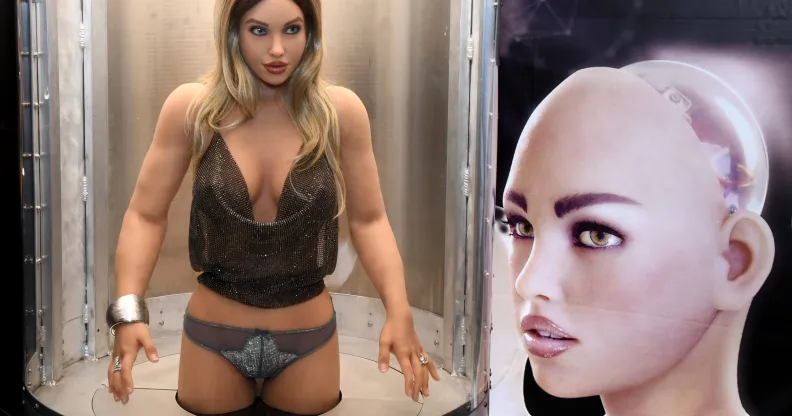We need to launch sex robots into space to keep astronauts company, says PhD candidate

A Harmony RealDoll customisable sex robot by Abyss Creations is displayed at the 2020 AVN Adult Entertainment Expo. (Ethan Miller/Getty)
Sex robots need to be launched into space to keep astronauts company and fulfil their sexual needs, a PhD candidate has explained.
Simon Dubé is a psychology PhD candidate at Université de Montréal, specialising in neuroscience and cognition of human sexuality, specifically sex tech and erobotics.
He defines the term “erobotics” as: “All virtual, embodied and augmented artificial erotic agents and the technologies that produce them. Examples include sex robots, erotic chatbots and virtual or augmented partners.”
In a piece for The Conversation, Dubé explained that while astronauts hurtle through space to increase our understanding of our universe, they are still human and they still have sexual desires.
He wrote: “Astronauts, despite their rigorous training, remain humans with needs.
“For space exploration and colonisation to succeed, we need to overcome taboos, consider human needs and desires and provide concrete, realistic solutions based on science rather than conventional morality.
“Can humans thrive for prolonged periods of time in small groups and in closed, isolated environments?
“Can humans contend with limited possibilities of relationships, intimacy and sexuality?
“Sex tech might have the answer.”
The first humans made it to space in 1961, NASA and other space agencies deny that anyone has ever had sex in space. Which, according to Dubé, means “either sex in space hasn’t happened, or no one is talking about it”.
He wrote: “While some people might be able to withstand a policy of total abstinence, it might be detrimental to the physical and mental health of others – especially as larger groups venture into space.”
The solution, he said, could be making “erotic technologies available to crews and settlers in space”.
The researcher continued: “Erobots could provide companionship and sexual pleasure to crew members and settlers. Beyond the capabilities of sex toys, erobots can incorporate social dimensions into erotic experiences.
“They could help with loneliness and the inevitable anxieties borne out of solitude. They could act as surrogate romantic partners, provide sexual outlets and reduce risks associated with human sex. Erobots could also provide intimacy and emotional support.
“And finally, erobots’ sensors and interactive capabilities could help monitor astronauts’ physiological and psychological health – acting as a complement to daily medical exams.”
With the multitude of benefits to sending sex robots into space, he said that the only thing standing in the way is people’s discomfort.
“Erobotics can contribute to space research programs,” he said. “As a field grounded in sexuality and technology positive frameworks, it recognises the importance of intimacy and sexuality in human life and promotes the development of technology geared towards health and well-being.
“Ultimately, we must shed our taboos regarding technology and sexuality as we journey to the final frontier.”

